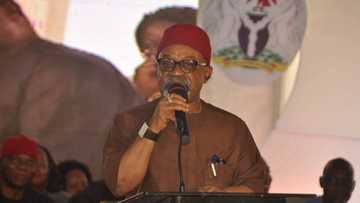ASUU, SSANU, NASU Make U-Turn Says Strike Not Ending Soon
- ASUU and other tertiary institutions disclosed that the negotiation meeting between the federal government and the unions has not led to any agreement of any sort as earlier indicated
- According to ASUU, the federal government and all stakeholders in the education sector and religious leaders had a meeting with the four unions but no strong agreements were reached
- Meanwhile, the leadership of ASUU and others extended the strike action by 12 weeks noting the federal government is not making its demand a top priority
PAY ATTENTION: Click “See First” under the “Following” tab to see Legit.ng News on your Facebook News Feed!
The Academic Staff Union of Universities and the Joint Action Committee of the Non-Academic Staff Union of Educational and Associated Institutions and Senior Staff Association of Nigerian Universities have said the federal government did not reach a strong agreement with them that can lead to calling off the industrial actions.

Read also
My children are also affected, minister of education Nwajiuba sympathises with ASUU over strike action
ASUU started its strike on February 14, 2022 and JAC commenced its own on April 14, 2022.
The national leaders of ASUU and JAC of SSANU and NASU, Prof Emmanuel Osodeke and Mr Mohammed Ibrahim, respectively stated that the federal government and all stakeholders in the education sector and religious leaders had a meeting with the four unions but no strong agreements were reached, The Punch reports.

Source: Twitter
Ngige's position on the matter earlier
PAY ATTENTION: Follow us on Instagram - get the most important news directly in your favourite app!
The minister of labour and employment, Senator Chris Ngige, was quoted in a report at the weekend as saying:
“We had a cordial and fruitful discussion; we looked at the issues dispassionately and reached some agreements, to the satisfaction of everybody in attendance.”
ASUU chairman said Ngige's claim was a political statement
But Osodeke said Ngige’s claim after the meeting that the unions would call off the ongoing strike this week was a political statement.
He said:
“We are not aware that we are calling off the strike. We met but there was nothing concrete between us and the government. Like we said before, we do not want promises, we want actions, if they show action and implement all the issues, we will go to our members, but knowing their antecedents, we know they will not do anything.
“They promised us since December 2020 and it is going to a year and a half, they have not done anything. We are waiting for them.
“As far as we are concerned, only when they sign our agreements, accept UTAS, release EAA and revitalisation funds will we call the strikes off.”
Ibrahim added that the major progress he could point to during the meeting was the ordering of the National Information Technology Development Agency, by the presidency who was represented by the chief of staff to the president and chairman of the meeting, Prof. Ibrahim Gambari, to subject the three payment solutions; Integrated Payroll and Personnel information system , University Transparency and Accountability Solution and University Peculiar Payroll Payment System, to integrity test and submit in three weeks.
He said:
“We are not talking about calling off strike now."
ASUU strike as old as Shehu Shagari's administration, it's endemic, presidency says
Femi Adesina, a presidential aide on media and publicity has said that the Academic Staff Union of Universities strike is not new.
Adesina recounted that the industrial action that has continued to affect Nigeria's tertiary institutions in Nigeria started long before President Buhari came into power.
According to the presidential aide, the ASUU strike is endemic and started as far back as the 1980s when Shehu Shagari was in power.
Over 10 million Nigerian girls not in school, UNICEF warns, adopts new initiatives
Currently, there are about 18.5 million out-of-school children in Nigeria, the United Nations Children's Fund has said.
The international agency said the figure is a sharp increase compared with the number of out-of-school children in the country in 2021.
According to UNICEF, 60 per cent of the population of children - which amounts to 1,100,000 children - are girls.
Source: Legit.ng




